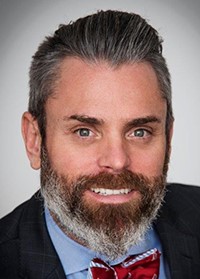COVID-19 healthcare program results announced in Northwest Arkansas Council’s winter meeting
by February 18, 2021 3:38 pm 1,097 views

Nelson Peacock, CEO of the Northwest Arkansas Council, speaking Thursday during the council's virtual winter meeting.
Business and healthcare leaders highlighted Thursday (Feb. 18) the success of a healthcare program to combat the spread of COVID-19, a new five-year plan of the Walton Family Foundation and work on a state hate crime bill. These were some of the topics presented at the Northwest Arkansas Council’s winter meeting that was hosted virtually.
Nelson Peacock, CEO of the Northwest Arkansas Council, said the council’s healthcare efforts at the onset of the pandemic pivoted from transforming the area to a regional healthcare destination to mitigating the spread of the virus.
Through community coordinated efforts, the council in late July was awarded $7 million in federal aid to develop a COVID contact tracing program to reduce the spread of the virus among Marshallese and Hispanic residents in Northwest Arkansas and in four counties in southwestern and northeastern Arkansas.
Pearl McElfish, vice chancellor for the Northwest Arkansas regional campus of the University of Arkansas for Medical Sciences (UAMS), released the results of the community efforts to mitigate the spread of the virus that disproportionately affected Hispanic and Marshallese residents. McElfish said the cases among these residents have plummeted and that new cases have become proportionate to the overall community spread.
Peacock also introduced Ryan Cork as the executive director for the Northwest Arkansas Council Health Care Transformation Division. Cork started in the role about two months ago, Peacock said. The division was created in 2019 to transition the area to a healthcare destination. A specialty care deficit in the region has led residents to seek such care outside the area and is resulting in nearly $1 billion leaving the region’s economy annually, according to a recent study.
As executive director, Cork will collaborate with Northwest Arkansas healthcare systems to implement the division’s action plan. This includes goals such as increasing graduate medical education positions, increasing integrative research and establishing a four-year medical school.

“Ryan’s experience leading institutions through large-scale growth and change will serve the region well as we improve access to innovative, affordable and consistent high-quality healthcare,” Peacock said. “Northwest Arkansas is growing rapidly, and our healthcare systems must expand and evolve to meet the growing needs of our residents.”
Cork previously served in several leadership positions including key roles with Cleveland Clinic’s locations in Abu Dhabi, United Arab Emirates and other countries in the Middle East and North Africa. Since 1994, he has served in the U.S. Navy and most recently with the U.S. Navy Reserves, Medical Services Corp. Cork’s career began as a senior medical corpsman for the Navy before taking the role of administrator at The Ohio State University Wexner Medical Center and James Cancer Hospital.
“My life experiences in the military and living abroad exposed me to a range of cultures and lifestyles, enabling me to respond appropriately to those with views different from my own,” Cork said. “I look forward to bringing my experience, data-centric business foundation and commitment to continuous improvement in large-scale healthcare operations to this role.”
Karen Minkel, Home Region Program director for the Walton Family Foundation, said the foundation completes five-year strategic plans, and 2021 is the start of a new five-year cycle. Goals for the Home Region Program include advance economic and cultural vibrancy, foster inclusive growth and a sense of belonging and support community leadership and capacity building.
Minkel said the area has experienced rapid economic growth, and she expects the area to continue to diversify. She also noted a quality of life survey showed 67% of respondents say the quality of life in the area is either excellent or very good but that more work needs to be done to ensure everyone is benefiting from what it has to offer.
“The good news is there are many opportunities for proactively addressing the challenges facing high growth communities like Northwest Arkansas, including supporting efforts to help all residents experience economic prosperity, helping neighborhoods become places of opportunity and ensuring residents can afford to live and work in the region,” Minkel said. “All of these elements really led us to this bold and inspiring vision that Northwest Arkansas is one of the most vibrant and inclusive communities in the nation. We know this vision is ambitious, and it’s necessarily broad because we recognize there’s a wide range of aspects of life that need to be impacted for all of this to become a reality.”
Karen Roberts, presiding co-chair for the council and executive vice president and general counsel for Walmart, spoke about the council’s support for diversity, equity and inclusion and that 160 businesses and organizations have pledged to address systemic racism and support a more equitable and inclusive Northwest Arkansas. She also noted Arkansas is one of three states without a hate crime law, and the council sees a statewide hate crime law as part of public policy.
Randy Zook, CEO of the Arkansas State Chamber of Commerce and Associated Industries of Arkansas, said the state needs such a law to protect its status as one of the best places to do business. The other two states without such a law are Wyoming and South Carolina but are working to approve one.
Zook noted the initially proposed hate crimes bill will be thrown out and replaced with one that’s expected to be more accepted by legislators. He said the new bill will not include a new crime but will allow enhanced penalties for violators. The violation and motivation must be proved without a reasonable doubt, he added. He cited FBI statistics showing that nearly one-fourth of race-based hate crimes are committed against white people and the same amount of males are victims of gender-based hate crimes. Also, 13% of hate crimes are committed against Christians.
He said the state legislature needs to approve a hate crimes bill this session “or else we’re going to end up the sore thumb in the map of the U.S. And that is just not an acceptable outcome.”
The council’s annual meeting is set for July 15.
